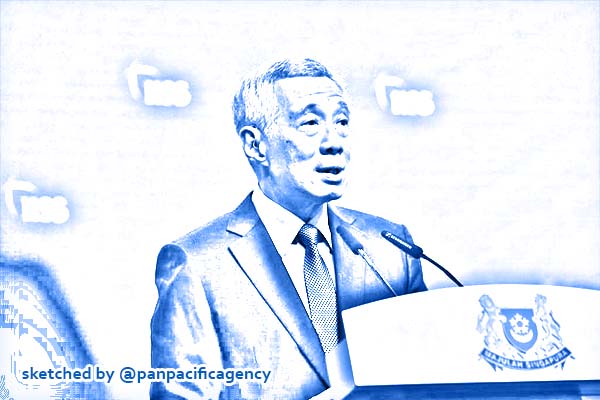Singapore must guard its reputation for openness: PM Lee

Prime Minister Lee Hsien Loong delivering his keynote speech at the Shangri-La Dialogue on May 31, 2019. Sketched by the Pan Pacific Agency.
SINGAPORE, Sep 3, 2020, BT. Singapore must continue to welcome talent and investment that creates opportunities for its people, and maintain its reputation for such openness, said Prime Minister Lee Hsien Loong in Parliament on Wednesday, with business associations cheering the assurance provided, The Business Times reported.
Such openness has kept investment projects coming despite the depressed economic climate, he noted. “Singapore has succeeded by being an international hub, tapping talents worldwide, and serving a global market. So even as we adjust our work pass policies, we must be careful not to give the wrong impression that we are now closing up, and no longer welcoming foreigners. Such a reputation would do us great harm.”
And the world is indeed watching, warned Mr Lee, noting recent articles in foreign media that implied that Singapore might be turning inwards.
Singapore International Chamber of Commerce chief executive Victor Mills agreed that to keep Singapore attractive to investors, the government must “speak consistently with one voice against the anti-foreign sentiment which is prevalent in society, given the economic fallout caused by the pandemic”.
“Singapore must remain open to foreign talent to remain a global hub for business and talent. Businesses must be able to bring in the talent they need,” he said, adding that Mr Lee’s speech on Wednesday “gave that assurance loud and clear”.
Singapore Business Federation chief executive officer Ho Meng Kit similarly stressed the need for Singapore to stay open “to global talent who brings value to Singapore and Singaporeans”, adding: “An overly restrictive policy on foreign manpower will impact trade and investments, which in turn dampens growth of the economy and job opportunities for Singaporeans.”
In this global crisis, investors and companies see Singapore as a safe harbour, said Mr Lee. “We take no joy in the troubles in the world, but it is a fact that in a troubled world, Singapore is one of the few trusted countries that stands out, and we must guard that reputation zealously.”
He gave a “sneak peak” of investments that are under wraps or being discussed but “hopefully on the way”. These include a pharmaceutical company planning to build a facility here to manufacture vaccines, and a company specialising in pandemic risk insurance that wants to enter. “These are opportunities which are directly coming out of the crisis.”
Several Fortune 500 companies are considering moving their regional headquarters here, because of political uncertainties elsewhere, while major financial institutions want to grow their operations here, he added.
Noting that the latter include IT and backroom operations, Mr Lee said that the government is conscious that IT is one area where there are worries about “over-concentration” of foreign talent. The government wants to discuss how such projects can fit in here and create good jobs for Singaporeans, he noted. “But for them to come here, they must feel welcome, and be allowed to bring in the talent that they need.”
Regional and global HQs need international teams; they will employ Singaporeans but cannot be staffed by Singaporeans alone. As these companies set up, though, more Singaporeans will be able to take advantage of the opportunities created, he said.
According to Singapore Manufacturing Federation president Douglas Foo, a “stable labour environment” will be a key attraction for investors, while a good blend of local and foreign talent is needed for enterprises to stay globally competitive.
“Singapore’s domestic market is too small to sustain our enterprises and this too applies to the size of the available Singapore workforce,” he said. Achieving a balance of employment for locals and foreigners is an ongoing quest, and one that is not unique to Singapore, he added.
Foreign worker policy has been a hot topic both in public discourse and the debate on the President’s address, which began on Monday.
Singaporeans’ anxiety about job competition from foreigners is understandable, said Mr Lee.
Employment Pass (EP) and S Pass numbers have come down since Covid-19, but work pass schemes must still be adjusted, he added, because there is more slack in the job market, but also because more Singaporeans are now able to take up PMET (professional, manager, executive and technician) jobs. That is why qualifying salaries are being tightened.
Beyond the overall numbers, employer fairness is also taken seriously. In evaluating EP and S Pass applications, the government takes into account whether the employer has been supporting local PMETs – or conversely, whether it has discriminated against qualified Singaporeans.
“This has always been government policy. But we particularly want to emphasise these considerations now, in these uncertain times, to remind all employers to play their part in building up their Singaporean workforce.”
Beyond the economic argument, there is a more fundamental question of national ethos, he added. “We have always been a people open to the world, welcoming others who can add value to our society, and bring the best out of us.”